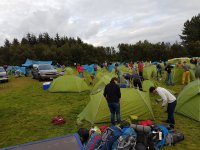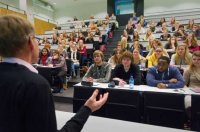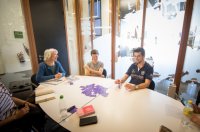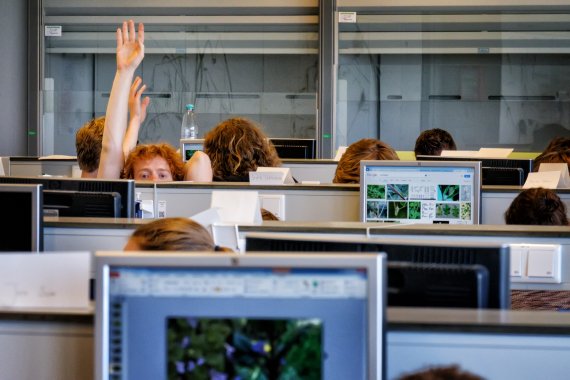Photos: Guy Ackermans, Roel Dijksma and Sven Menschel
Former teacher of the year Roel Dijksma’s window is adorned with two small white megaphones. A symbol of the problem of ever-increasing numbers of students and the many ways teachers and students adapt to the situation. Dijksma has some striking examples.
We started out taking 14 students to Iceland; this year 64 are going along.’
Take the annual Catchment Hydrology field trip to Iceland, for instance. ‘An eight-day study tour which is fantastically popular,’ says Dijksma. ‘When we started out we took 14 students; this year 64 are going along.’ That means renting an awful lot of tents, driving in convoy in seven large vehicles, and giving the local supermarkets advance warning. ‘Otherwise we’ll clear the shelves of bread and the Icelanders themselves will have nothing to eat for three days.’

The annual Catchment Hydrology field trip to Iceland started small, with 14 students, and is now a major event, with 64 participants.
Evening work
Or take the field trip to the Ardennes, which is part of the Hydrogeology course. ‘I have switched locations three times already, because we kept growing out of them. And it is quite a hunt every time. That’s because I don’t want to go to a campsite. After all, this is an educational trip, not a camp.’ Dijksma even goes so far as to allocate beds in advance. ‘This year there were eighty of us. If you don’t do that, it will take hours before everyone has found their bed. And figuring all that out is evening work. Those are the sorts of things you didn’t have to do in the past.’
Oh yes, and those megaphones. ‘Not everyone has the voice to lecture to a group of 80 students,’ says Dijksma. But he sees these things as challenges. ‘I refuse to say we’re full. We’ll solve the problems. We try to avoid having to adjust the content of the field trip because of the size of the group.’
 Such adjustments are in full swing elsewhere in Wageningen education, however. A Resource investigation earlier this month showed that three quarters of the chair groups have adjusted the education programme to cater for the growing student numbers (see inset)
Such adjustments are in full swing elsewhere in Wageningen education, however. A Resource investigation earlier this month showed that three quarters of the chair groups have adjusted the education programme to cater for the growing student numbers (see inset)
. In its most rigorous form, this has meant scrapping course components. ‘One component of the Master’s level course Structure and Reactivity was always that students had to write an essay based on what they had read on a particular theme,’ says professor of Organic Chemistry Han Zuilhof. ‘So we stopped doing that when the group went over 30. Please note: we are talking about essays of 15 sides that the teacher has to read and grade. That got too much.’
Erosion of standards
Jan van Kan of the Phytopathology chair group offers another example. ‘In our practical on Plant-Microbe Interactions, there was a component on protein electrophoresis, a technique for separating proteins on a gel. You can buy that gel or you can make it yourself, but that involves working with toxic substances. With a large group there are safety concerns so we scrapped that experiment to keep the practical safe and workable. Ten years ago you could let students get to know such a technique, so they could work with it at the final thesis stage. You can’t do that anymore. The same practical included measuring the pH during plant cell culture with a sensitive, fragile and expensive electrode. We’ve got one and with a group of 20 students they can all have a go at measuring, but with double that number it turns into a demonstration. Nowadays we’ve replaced the experiment with something else.’
Insufficient equipment is a much-cited problem. Less access to sophisticated equipment is another. ‘When I was a student here myself, you did the practicals at the chair group,’ says Jaap Keijer, professor of Human and Animal Physiology. ‘Now the practicals take place in the Forum or in Orion, where none of the complicated apparatus is located. Nowadays, at best, students get to see that kind of apparatus during a field trip, or only when they get to the Master’s stage. That is an erosion of standards.’
Knowledge clips
Scrapping components is only resorted to in exceptional cases, though. The preference is for making practicals more efficient so as to cope with bigger groups. The Food Technology degree programme already faced a big increase in student numbers three years ago. ‘You feel the pinch first in the practicals,’ explains programme coordinator Anja Janssen. ‘The solution was to split the group. One group does a practical while the other works on knowledge clips, for example.’
You feel the pinch first in the practicals
A lot of chair groups have started working with these online modules using film clips which explain basic skills and how to use equipment. Janssen: ‘You can do the planning and preparation of an experiment online. Nothing changes in the learning goals, just in what goes on around the hands-on work. That even improves the practical in terms of content, because students start out better prepared.’
Professor Zuilhof confirms the benefits of the knowledge clips. ‘If you need to learn how to work with a gas chromatograph, you first get an explanation of how the machine works, where you put the specimen, etcetera. The teacher used to do all that, and now we do it with a film. There are 40 such films on YouTube. All made by us. Do it well once and you’re done.’
Time-consuming
Full use is being made of digital resources in class too. Zuilhof mentions web-learning. ‘We make use of that throughout the Bachelor’s. These are questions you answer online. You can only go on with the material if you’ve completed the previous assignment. Students who come to a practical after doing some web-learning are better prepared, on average.’
In Janssen’s chair group they make their own interactive modules for the classes. ‘Our students get a lot of classes in which they carry out assignments and make calculations to help them assimilate the knowledge. This material is so complex that we also anticipate the most common errors of thinking. Students get feedback on that through the module. That enables you to cope with a large group of students with just a few supervisors. Then the teachers are there to give more explanation and guidance if students really cannot figure it out themselves.’ Food Technology has two large Bachelor’s courses and a Master’s course that are equipped with such material. ‘There are more to come,’ says Janssen, ‘but developing them is very time-consuming.’
Less popular
Professor Keijer echoes this caveat. ‘Making more use of digital resources is a natural trend. Students learn more and more visually thanks to the rise of the digital media. But it is a mistake to imagine that using digital media leads by definition to greater efficiency. It takes an awful lot of time to establish digital learning. And then you have to bear in mind that lectures are not the same every year. You try to integrate new data into your course material all the time. In a digital course that requires much more adaptation and it takes more time.’ According to Keijer, students are not all that enthusiastic either, if digital learning means less contact with teachers. ‘Last year we tightened up on the contact time in the distance learning course Essentials of Nutritional Physiology. But it didn’t work. The students got lower grades and gave the course lower evaluations.’

Professor of Rural Sociology Han Wiskerke is similarly critical of the claims that new methods have increased efficiency. His group has tried out the concept of the flipped classroom in several classes. ‘The core idea is that you set homework in advance so that students can discuss it in class. That is how the usual system is flipped: Learning at home and consolidating the knowledge in class. The teacher is there to supervise and to answer questions. But preparation is time-consuming. And it only works if the students prepare properly. If that doesn’t happen, you have a lot of follow-up work. Often, it is easy to claim that there are methods with which you can teach with less time input, but the reality often falls short.’
Thesis circles
Another well-known way of coping with rising student numbers is the thesis circle. Both Bachelor’s and Master’s students round off their degree programmes with a thesis. A lot of work goes into supervising these projects. One alternative option is thesis circles: groups of students supervising each other. This has met with varying success. ‘We have experimented in the Bachelor’s phase, but in our case it meant sacrificing quality,’ says Carlijn Wentink, programme coordinator for the Health and Society chair group. ‘So we stopped. It puts extra pressure on the students and the feedback they gave each other was not good enough. We do plan to introduce it in the Master’s, though. I think Master’s students are more capable of giving feedback. But a thesis circle does not replace supervision: it is something extra. The feedback in the thesis circle is mainly about whether the writing is clear, and about academic skills.’

In Keijer’s group too, the thesis circle in the Bachelor’s programme has bitten the dust. The idea here was actually that students assessed each other’s work on the content. ‘A teacher is involved, but just to guide the process. Our experience is that a thesis circle does not promote good quality. Nor was it more efficient. We kept up the existing supervision – which was already very intensive – on the assumption that it would take less time thanks to the thesis circle. That was not the case. And another factor is that the students were not all positive. The weaker students enjoy it, but the strong ones complain that they don’t learn anything. They say: all we are doing is helping other students. So we stopped. But in the Master’s programme it does work. That’s because Master’s students have more baggage and they are ready for it.’
Supervision tickets
Keeping the work pressure during thesis supervision within bounds sometimes requires drastic measures. An admissions cap, for instance, as in the Health and Society programme. ‘Previously, everyone was welcome,’ explains programme coordinator Wentink. ‘But we can’t keep that up anymore. We’ve got four chair groups involved in one programme. On the Bachelor’s programme we now have 75 students between us who want to do their thesis with us. Three quarters of them want to do it with Health and Society. And we’ve got six supervisors available for it. That doesn’t work. We can allocate a maximum of four of five to each supervisor. We’ll find places for the rest in other groups, in consultation.’
We want to bring in a ticket system for thesis supervision
To steer the process properly, an application round has been introduced, in which students can say who they would prefer to have as supervisor. The range of possible thesis topics is now more limited too. But other options for keeping supervision manageable are being considered. ‘We are contemplating bringing in a ‘ticket’ system,’ says Professor Wiskerke, whose chair group is part of the cluster. ‘A kind of ticket giving you the right to a certain number of hours of supervision. Students can then decide for themselves how to make use of that time. Our aim is to divide the available time more fairly.’
Dunes
Meanwhile, Dijksma has other things on his mind. In a couple of weeks it is time for the field trip to the dunes near Zandvoort, an important source of water. ‘I have permission to go into the area with 20 people on bikes. When the group got bigger I first divided it into two groups of 20. But since then they have grown from 20 to 80. And of course, they are not going to give permission for that, so now I’ve got to divide the group up again.’
Dossier on growth
The continuing growth in student numbers has been much on people’s minds in Wageningen for a while now. To get the measure of its implications for teaching staff, Resource conducted a survey last month. It showed that their workload is very heavy, they are being forced to adapt their teaching methods, and there is less personal contact. The results were published in the last issue. In this sequel, teachers talk about how they have adapted their teaching methods to cope with the growth.

